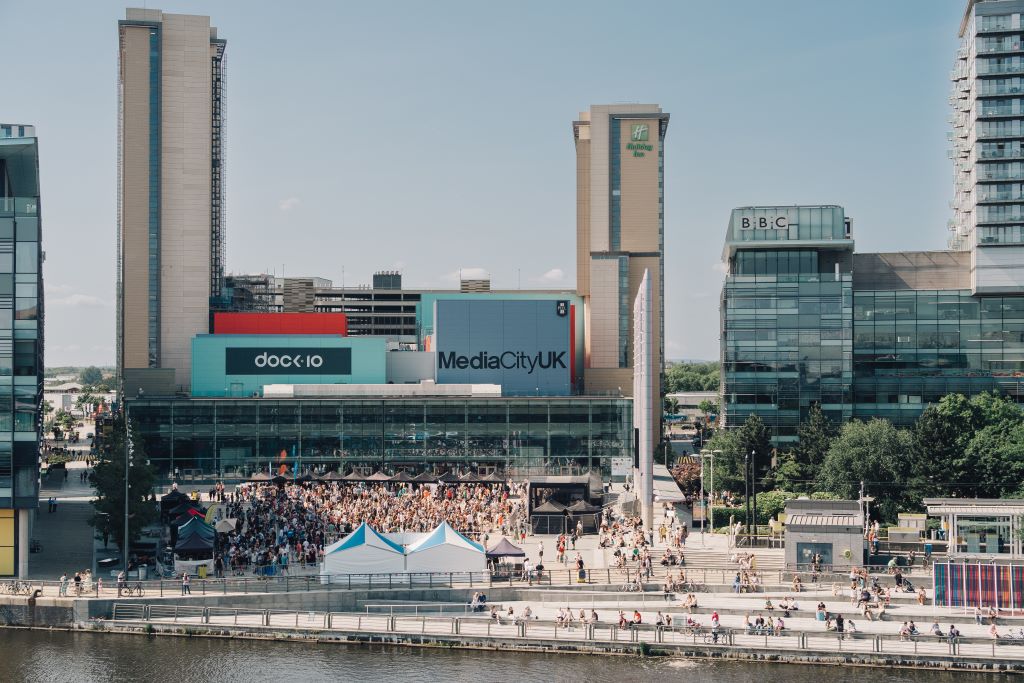The Subplot
The Subplot | Muddlesbrough untangled, Towns Fund, Manchester arts
Welcome to The Subplot, your regular slice of commentary on the business and property market from across the North of England and North Wales.
THIS WEEK
- Teesside teaser: can a change in political power, and a new mayoral development corporation, begin to resolve Middlesbrough’s property problems?
- Elevator pitch: your weekly rundown of who and what is going up, and who is heading the other way
TEESSIDE TEASER
Muddlesbrough untangled?
There’s a genuine shortage of good office and industrial floorspace in Middlesbrough. Can new council leadership, and a new mayoral development corporation, cut through?
There’s a story to tell about Middlesbrough beyond the usual cliches about huge industrial facilities and lots of empty space (see local view above). Demand for new office and industrial floorspace is good – excellent, say some – and whilst volumes won’t blow your mind, it’s genuine and unmet. This is an opportunity, surely?
Nice little market
First, the good news. The commercial property market is back in business. Centre Square will create 200,000 sq ft of prime town centre offices in six buildings – two are complete so far. It’s the kind of space that local occupiers like AXA Insurance rather enjoy – having taken a 40,000 sq ft building, completed by Ashall Projects and funded by the Tees Valley Mayor and local council. In the industrial sector, Tees Advance Manufacturing Park’s 180,000 sq ft first phase has been scooping up tenants. The council is the main mover here along with the Tees Valley Mayor and partners including Cleveland Property Developments.
Supply issues
“TeesAMPS and Centre Square show commercial property can work. There’s limited supply and real demand,” says Dodds Brown senior partner Stephen Brown. Top office quoting rents are about £21.50/sq ft, which is £5/sq ft short of viability, give or take. Tees Valley Combined Authority figures show the supply of office space was down 10% between 2016 and 2021, during the permitted development rights period.
Unhappy
So what’s the problem? Whilst Middlesbrough Council has clearly pulled its regeneration weight, it has done so against an unsettled background. The council recently lost its chief executive in what amounted to a coup d’etat, and what’s left has been given a written warning by the government for wasting money and bad “cultural and governance” issues. The council has until January 2024 to show it can improve, otherwise, ministers will take matters into their own hands.
Cleaning the streets
A new Labour Mayor, Chris Cooke, backed by a new Labour council majority replaced the Independent/Conservative regime two months ago. They have a big job ahead.
The worry is about routine capacity and long-term vision. For instance, it’s dandy to build new offices but if the surrounding area isn’t maintained, and the town centre fails to thrive, then shiny new office blocks won’t stay full.
“Office occupiers need to know their car is safe,” as one bone-dry observer put it to Subplot. Put this another way: “What’s needed is a deliverable, sustainable plan to take things forward once building work is completed,” says Brown. His concern is that the focus is on residential at the expense of commercial use in the town centre, and the wrong mix could be damaging.
Opportunities
These concerns – and question marks over the future of council-owned retail assets the 400,000 sq ft Cleveland Centre and the 120,000 sq ft former House of Fraser department store – raise questions for investors or occupiers. When approached by Subplot, the council said it planned to continue to manage the (viable) shopping centre, and wanted to sell or let the department store. There are folk in the town who wonder if that’s good enough. The new development corporation strategy could put those fears to rest (see below).
Clarity needed
Problem two is HM Government’s plan for an investment zone in the town. It sounds promising, and everyone loves the idea, but as Subplot reported last week (13 July), the details of who gets what are still sketchy. It’s early days. For now, Subplot has heard tales of investors deciding to sit on their hands, and occupiers pausing requirements for Centre Square thinking that, if they wait, they’ll qualify for investment zone capital allowances or tax breaks. This is not ideal.
Two tribes
Behind these concerns sit doubts that the council and the new mayoral development corporation can work together. Middlesbrough Mayor Cooke and Tees Valley Mayor Ben Houchen sail under different flags, and Middlesbrough Labour hasn’t been a massive enthusiast of Houchen’s corporation. The new MDC board – including Cooke and Houchen – met yesterday to consider strategy. You can read the full text here. Arup advised.
The new plan
Highlights include new digital and media properties in the Boho cluster (already prepping a 35,000 sq ft extension, as Place North East reported), and redevelopment of the ex-House of Fraser store, former Debenhams, and Civic Centre; a new school of art campus anchoring the Centre Square neighbourhood, and a historic quarter. It all sounds clean and bright and good.
Cold water
Where does this leave us? Subplot spoke to one of Yorkshire’s big regeneration brains, and an acknowledged development corporation expert.
“Politicians see a fashionable regeneration idea and they want to have it – but that’s the wrong way round,” the expert says. “The delivery vehicle has to follow the function, what you want. You have to know what you want. And it requires strong leadership, which goes beyond electoral cycles. I mean, if this were easy, it would already have been done.”
Could politics and the desire to deliver results quickly, in time for elections, screw up what might otherwise be an appealing and achievable town centre regeneration? As Stockport’s MDC shows (Subplot, 13 July), politics is often decisive for the success of development corporations. Middlesbrough has a big challenge ahead.
 ELEVATOR PITCH
ELEVATOR PITCH
Going up, or going down? This week’s movers
Manchester’s Factory International plunges to the basement car park loaded with new borrowing. Levelling up money also goes missing somewhere near the ground floor. Doors closing, going down!
 Factory International funding
Factory International funding
Another £20m of Manchester City Council (borrowed) money gets tipped into the huge hole that is Factory International, mooted in 2014, now double its original 2017 budget of £110m, and still not finished. Covid was a pain, and rising inflation hasn’t helped, nor did a rush to have something ready for the 2023 Manchester International Festival. Why the rush? Because the project was already two (or four) years late.
A council report also blames the “complexity and uniqueness of the building.” Maybe somebody should have thought of this because concert halls are not uncommon, art galleries are pretty well understood, and complexity is an obvious cause of financial risk in any building. If all this complexity produced a stunning eye-catching landmark of global appeal then maybe it’d be worth it, but judging by below-the-line reactions to Place North West’s coverage, it hasn’t.
The big question all through has been: who is or was in charge of this monster (Subplot, 21 February 2021)? The latest council report lists five – five! – responsible senior officers, which maybe tells its own story. It isn’t very encouraging that the £330m Manchester Town Hall project is also heading into years of delay.
 Towns fund, affordable housing, etc, etc
Towns fund, affordable housing, etc, etc
A footnote to last week’s update on HM Government’s investment zone plans. TL;DR if you were hoping the levelling up agenda would turn into a wonderful work stream, think again. Last week, the Department for Levelling Up, Housing, and Communities returned £1.9bn of unspent 2022/23 funding, a large slug of which was meant to unlock affordable housing. Apparently, it can only be spent when the property market is doing well, which seems the exact reverse of how it ought to be, but who are we to judge the ways of Whitehall?
Whilst one spending pot atrophies, a couple more are in limbo. The £2.6bn UK Shared Prosperity Fund, intended to replace EU regional money, is moving glacially, and on a very modest scale. A list of grants awarded in June isn’t likely to cause a stir or spread much prosperity – could Liverpool City Region contain its excitement at getting £1.4m? – and the whole idea seems to be on ice.
The Towns Fund got off to a flying start but has since landed heavily. A second round of funding isn’t looking likely. The website died in late 2021.





The levelling up agenda is dying whilst the whole country is levelling down: weak economics, struggling public services, inadequate infrastructure, shortage of housing.
By Anonymous
The factory is a disaster …it’s sucking all the arts and culture funding from the rest of the north west and many other worthy projects not taking place because of the never ending requirement fir more funding
By George
The levelling up agenda was never an agenda in the first place. It was a soundbite without reference or a plan. They liked the soundbite so much they named a department after it, but it’s never meant anything.
By Unlevelled for balance
The idea of the factory is to get more people from around the north west to leave their own towns and drive to Manchester
By Gilly
‘Gilly’
As if.
By SW
Funding aside, which is very important, I am actually very disappointed that the factory has taken the MIF away from the city centre, I used to love walking around at lunch time finding random events to watch / listen to. Now we would have to walk all the way to the Factory to see these things, silly really.
By Surprised